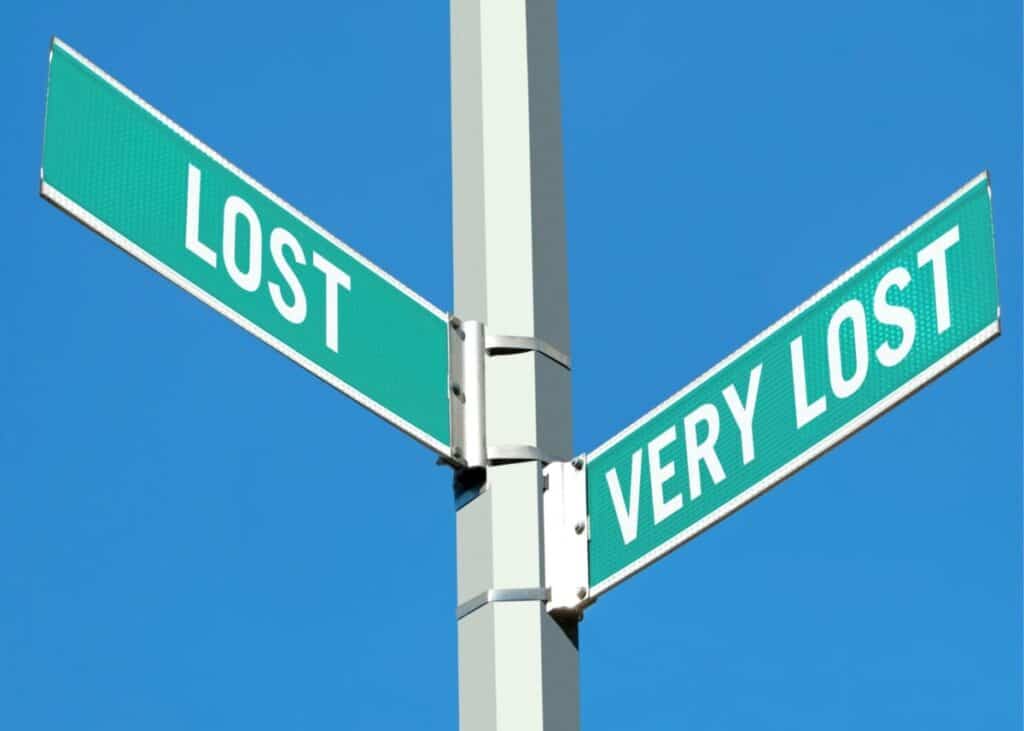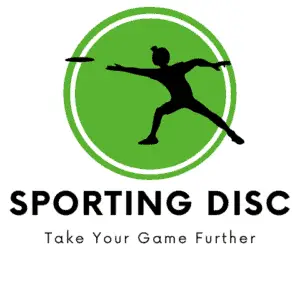I’ve thrown my fair share of errant discs. But, luckily I’ve not lost a disc yet. But, sooner or later it will probably happen. Which makes me wonder what that does for scoring and playing the rest of the hole?
Whether you lose your disc or find someone else’s lost disc, there are certain rules (written and unwritten) that should be followed for dealing with a lost disc. I’ll cover everything that you’ll need to know if you lose your disc.
Table of Contents
What Happens If You Lose Your Disc in Disc Golf?
If a disc is lost, a player is given 3 minutes to search starting as soon as they arrive at the area the disc was believed to be. If not found, the player receives one penalty throw and plays from the previous lie or a drop zone. All players should put contact information on discs in case they are found.
In this article, I’ll talk about the rules for a lost disc, what to do if you find a lost disc and how you can ultimately lose discs less often.

Do You Lose Discs in Disc Golf?
If you haven’t yet lost a disc, sooner or later it will happen that a disc you’ve thrown will get lost. Most of the time when this happens it’s because the disc landed in a rough out-of-bounds area or a heavily wooded area.
Depending on how much you play, you might lose 1-2 discs during the year. The point is that many factors can contribute to losing a disc. The layout of the hole, a heavily wooded area, low visibility, etc.
Just be aware that everyone will eventually lose a disc at some time when playing disc golf. There are some things that you can do to possibly get back a lost disc if you’re unable to find it yourself.
How To Mark Your Disc in Disc Golf
If you’ve looked everywhere and still can’t find your disc, you’re probably going to have to accept that the disc is lost for the time being and move on.
It’s never a great feeling to lose any disc. But, there still is hope. marking all your discs is a good way to ensure that your disc could still be returned to you if some other player happens to stumble across it.
When marking your discs, here is some key information that you should include on the disc so someone could return it to you if possible.
You’ll want to write this information on the bottom of the disc on the inside of the rim. Here are some details you should include:
- Full Name
- Phone Number
- PDGA # (if you have one)
Keep in mind that sadly, not everyone will return your disc if they find it. Some people will simply keep the disc for themselves. Others don’t want to deal with the hassle and just leave it where it lies.
But, for those fellow players that find a lost disc, some might get in contact with you to return the disc.
PDGA Rules For a Lost Disc
The PDGA has some specific rules for a lost disc when in competition, or to apply to practice rounds for scoring purposes.
The relevant section of the PDGA Rules is 805.03 Lost Disc. This is a summary of what the rules state for a lost disc during play:
The disc is not declared lost until the player who threw the disc has searched the last known area of the disc for 3 minutes. The 3 minute search time will begin once the player has entered the area where the disc was believed to have landed.
PDGA Courtesy Violation For a Lost Disc
It’s not just the player who threw the disc who is responsible for locating the lost disc either. All players in the group have to help search for the disc.
If a player refuses to help look for the lost disc, they’d get stuck with a courtesy violation, which carries its one-throw penalty. See here for more information on courtesy violations.
What Happens After 3 Minutes Are Up?
After the 3 minutes have elapsed and the disc is still not found, it will be declared lost. The penalty for a lost disc is a one-throw penalty.
The next question, is since the disc was lost, where will the throw take place at? The PDGA rules for a lost disc state that the next throw should be made from the previous lie or at a designated drop zone.
For a full review of the Lost Disc Rules as outlined by the PDGA, go here to see the official outline.
How Do I Find My Lost Disc?
There are some steps you can take to decrease the chances that you lose your disc and have to abandon it because you’re unable to find it.
I’ve already mentioned properly marking a disc to help increase the chances that someone will return your disc if they happen to find it.
But, to avoid getting to the point of relying on a good samaritan to return your lost disc, here are some steps to take to help you more easily find the disc yourself.
1. Use Discs With Bright or Contrasting Colors
Throwing discs that are bright and stand out against the foliage and ground are going to be easier to find.
You might not think about this fact when buying a disc, but you’ll be thankful when you can easily locate it in an overgrown area of the course.
2. Avoid Discs That Will Blend in With Nature
On the opposite side of bright contrasting colors, discs that easily blend into their surroundings are going to make it very difficult to find.
Brown, certain shades of green, tan, or another matte color will easily blend into nature and make it very difficult to see them.
3. Play With a Group When Possible
When it comes to a lost disc, the more people the better. It’s always better to have an extra set of eyes to help locate the exact landing spot if there is an errant throw.
Plus, if you’re following the PDGA rules, the player in your group should be helping to find the disc too.
4. Try To Stay On the Fairways
This should seem all too obvious, but staying out of an out-of-bounds are trouble area will help not to lose discs. It’s an earth-shattering statement, I know.
What this is meaning is that for a beginner, you should play within your skill level and with a disc that reflects your current skill level.
If you’re trying to throw discs that don’t match your arm speed or can’t be thrown accurately you’re only going to increase the chances of losing a disc.
What To Do If You Find a Disc
Finally, you’ll want to consider what you’d want to do if you are the one to stumble across a lost disc when playing.
Do you return the disc, keep it for your collection, or just leave it where it lies? Everyone has their reasons and they are sometimes hotly debated.
The right thing to do if you find a lost disc is to try to return it to its rightful owner. This is even more true if the disc is marked with contact information.
If you find a lost disc with clearly-marked contact information, you should make a reasonable attempt to return the disc to the owner.
The easiest way is if there is a phone number, try to contact that person and let them know you have the disc. If they want it they will make a reasonable attempt to retrieve the disc from you.
It turns out that most of the time if they’ve gone to the trouble of marking their disc they will probably do what they can to get it back from you and be grateful.
If you’ve made reasonable attempts to contact a person or return the disc and still can’t make contact after a week or so, it’s probably safe to go ahead and keep the disc if you’d like or dispose of it if you don’t.
There are no set rules to this, it’s just common courtesy and common sense that should dictate your actions.
Final Thoughts | What Happens If You Lose Your Disc?
Losing a disc is a part of the game. In normal ball golf, there are lost golf balls, but that doesn’t seem to be the same. A ball in my opinion is a little easier to abandon and replace than your favorite disc.
The best way to not lose a disc is to stay out of the trouble spots on the course, use brighter colored discs, and mark all your discs in case you do lose one and someone else finds it.
Just remember that unfortunately there is a penalty during play for losing a disc, so be aware of the rules for a lost disc if you happen to lose one the next time you’re playing disc golf.
